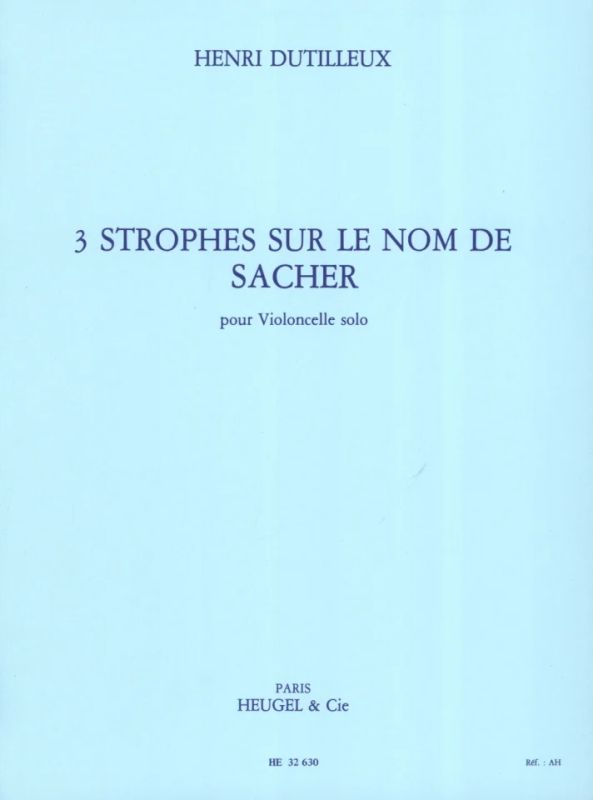

He was also a cousin of the mathematician Jean-Louis Koszul. He was the great-grandson of the painter Constant Dutilleux and grandson of the composer Julien Koszul. Henri Dutilleux was born on 22 January 1916 in Angers, Maine-et-Loire. He also taught at the École Normale de Musique de Paris and at the Conservatoire National Supérieur de Musique, and was twice composer in residence at the Tanglewood Music Center in Lenox, Massachusetts. In addition to composing, he worked as the Head of Music Production for Radio France for 18 years. … But his voice, marked by sensuously handled harmony and color, was his own." ĭutilleux received several major prizes throughout his career, notably the Grand Prix de Rome (1938), International Music Council's International Rostrum of Composers (1955), the Grand-Croix de la Légion d'honneur (2004), the Ernst von Siemens Music Prize (2005), the Gold Medal of the Royal Philharmonic Society (2008) and the Marie-Josée Kravis Prize for New Music (2011). Between Olivier Messiaen and Pierre Boulez in age, he was little affected by either, though he took an interest in their work.

Dutilleux’s position in French music was proudly solitary. In The New York Times, Paul Griffiths wrote, "Mr. French organist Gaston Litaize also asked Dutilleux many times to compose for the organ, but nothing came from it the two first met in 1938 at the Grand Prix de Rome, which Dutilleux won and at which Litaize finished second. Works were commissioned from him by such major artists as Charles Munch, George Szell, Mstislav Rostropovich, the Juilliard String Quartet, Isaac Stern, Paul Sacher, Anne-Sophie Mutter, Simon Rattle, Renée Fleming, and Seiji Ozawa. Most of these are regarded as masterpieces of 20th-century classical music. Some of his notable compositions include a piano sonata, two symphonies, the cello concerto Tout un monde lointain… ( A whole distant world), the violin concerto L'arbre des songes ( The tree of dreams), the string quartet Ainsi la nuit ( Thus the night) and a sonatine for flute and piano. His small body of published work, which garnered international acclaim, followed in the tradition of Maurice Ravel, Gabriel Fauré, Claude Debussy, Albert Roussel, but in an idiosyncratic, individual style. If you believe that any review contained on our site infringes upon your copyright, please email us.Henri Paul Julien Dutilleux ( French: 22 January 1916 – ) was a French composer active mainly in the second half of the 20th century.

3 strophes sur le nom sacher plus#
All submitted reviews become the licensed property of Sheet Music Plus and are subject to all laws pertaining thereto.If you have any suggestions or comments on the guidelines, please email us. We cannot post your review if it violates these guidelines.Avoid disclosing contact information (email addresses, phone numbers, etc.), or including URLs, time-sensitive material or alternative ordering information.Please do not use inappropriate language, including profanity, vulgarity, or obscenity. Be respectful of artists, readers, and your fellow reviewers.
3 strophes sur le nom sacher free#
Feel free to recommend similar pieces if you liked this piece, or alternatives if you didn't.Are you a beginner who started playing last month? Do you usually like this style of music? Consider writing about your experience and musical tastes.Do you like the artist? Is the transcription accurate? Is it a good teaching tool? Explain exactly why you liked or disliked the product.His work also includes a Piano sonata, two symphonies, the Cello concerto 'Tout un monde lointain' (A whole distant world), the Violin concerto 'L'arbre des songes' (The tree of dreams) and the string quartet 'Ainsi la nuit' (Thus the night).". Henri Dutilleux was internationally acclaimed for his work, winning prizes such as the Gold Medal of the Royal Philharmonic Society and the UNESCO's International Rostrum of Composers, among many others. A quotation from Bartok's piece 'Music for Strings, Percussion, and Celesta' can be noticed at the end of the first verse. The whole set requires the lowest strings of the Cello to be turned lower: G string to F sharp and C string to B flat. Henri Dutilleux composed the first part of this volume for the celebration and added the final two pieces later in 1976. It was first performed in an audition by the latter in 1982. "Written on the occasion of Paul Sacher's birthday, this 3 Strophes in the name of Sacher features three Cello pieces composed by Henri Dutilleux and reviewed by Mstislav Rostropovitch.


 0 kommentar(er)
0 kommentar(er)
